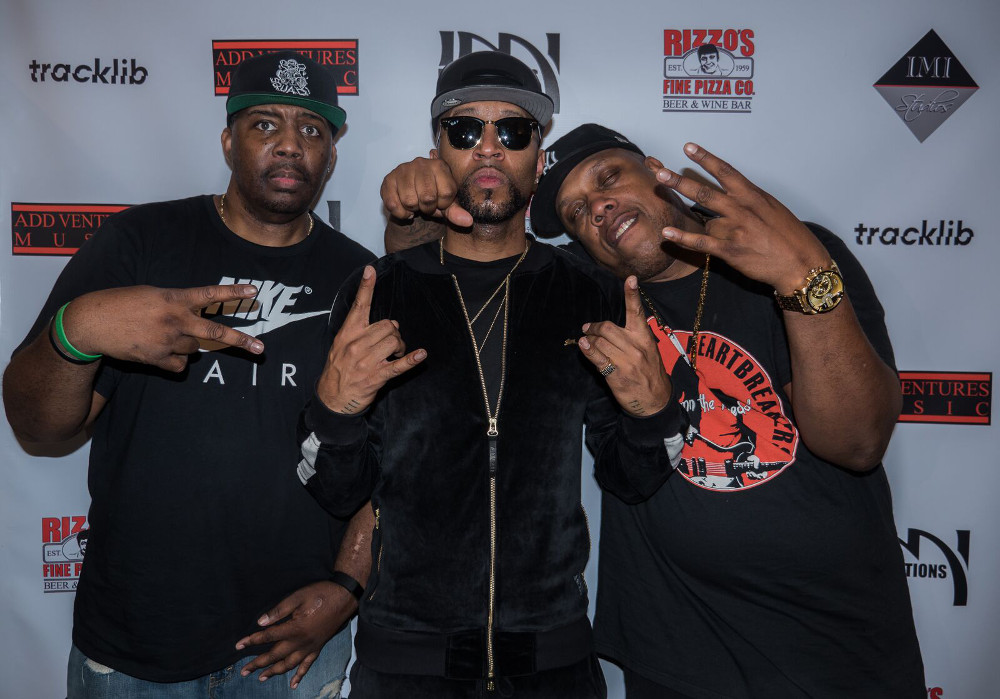Sampling Will Never Be the Same: Tracklib Has Arrived
Are we on the verge of a movement?
Pär Almqvist, founder of the Swedish startup Tracklib, seems quite confident of that – a Track Liberation movement to be specific. As the world’s first and only music service that enables music creators to discover, sample, and license original recordings, Almqvist’s goal is to set the global archive of recorded sound free to converge with the world of music production.
Peer deeper into Tracklib’s model, and you’ll see that it has nothing to do with loop libraries or sample packs. Instead, the service has a growing library of 60,000+ full-length tracks and growing, including one of the most sampled songs in music history, the Honeydrippers’ “Impeach the President.” Users can browse the library, listen to full tracks, save their favorites to their collections, and search by categories such as genre, region, song key, BPM, or release date. They can then purchase and download songs for $1.99 each, create their own tracks that sample the songs, and then obtain a license with ease for as little as $50.
The result of this approach is a far wider palette sounds for an artist, producer or beatmaker to choose from. In search of inspiration, the ability to scan an entire song for a key moment opens up huge possibilities, significantly increasing the opportunity to create something original via this sonic blast from the past.
Almqvist’s background as a musician, composer, IT specialist and entrepreneur are all natural lead-ins to his founding of Tracklib. His time as CMO of a renewable energy company may seem like a non-musical anomaly, but it makes perfect sense if you think about it: Evolutionizing the art of crate-digging and music sampling is all about drawing a fresh boost from what’s already out there. In this interview with SonicScoop, Almqvist makes that connection crystal clear.
Give us the Tracklib elevator pitch. What does your service do?
Tracklib makes it possible for music makers to discover complete recordings of songs they want to sample, download them to use in their own original tracks, and then easily license the resulting songs.
We’re bringing back the original creative impulse behind sampling records, and making it fast, easy, and affordable – empowering music creators and liberating the next evolution in music making.
What are the problems that Tracklib solves, both for music creators and for labels/publishers?
Clearing samples of songs is usually slow, complicated, and costly. It’s a problem that’s been plaguing the music industry since sampling first became popular over three decades ago. So people have turned to services that only gives them beats or loops – or they just hope that no one catches their unlicensed sample. With Tracklib, you can use the original recording of a song and know upfront what a license will cost – even before you listen to the track.
For labels and publishers, Tracklib is a boon in two ways: we drive discovery of great music, and we also make the process of releasing sample-based music really simple and painless, so all the creators and rights-holders can earn royalties from streams and downloads. It’s a win for everyone.
You call Tracklib the “Billboard Charts in Reverse.” Why do you say that?
Just take a look at the Tracklib chart with our most popular tracks right now – it’s a great mix of early ’70s Soul, Chinese Opera, obscure Jazz, and more. We help surface unusual music that eventually ends up on the Billboard charts as samples in new songs. It’s really amazing to see.

“It’s Very Straightforward”
How would you explain the process of getting fully-cleared samples from Tracklib for an artist/producer?
It’s very straightforward. We’re taking the process of vinyl crate-digging online. You can start by searching categories such as genre, region, song key, BPM, or release date, and then listen to full tracks.
You then save your favorites to your collections, and when you decide you want to start playing around with the sample, you download a full quality WAV file of the recording – for some songs even the individual multi-tracks – for $1.99. When you have created a new song using that sample, you go back to tracklib.com and get your license by entering basic information about how much of the original song you have sampled and a few more details.
The sample license explains how much of the track’s revenue you need to share with the original labels and publishers, and contains all the information you need to register the song with a publishing rights organization — BMI, ASCAP, PRS — who will handle that split, and also ensure that you get paid as well. That’s it, really!
As a music creator, what is everything that you get with a license?
You get full worldwide rights to commercially release a new song containing samples of that work.
That’s pretty straightforward! Now, specific to music supervision: If an artist creates a song with a Tracklib sample that then gets into a commercial, film or other sync scenario, please explain how everyone involved – the Tracklib user, the owner of the original song that was sampled, and the music supervisor – is fully covered.
A sample license from Tracklib gives the new artist/label full freedom to say yes to sync requests. From there, they just need to pay the same percentage of revenue received from the sync to Tracklib. We then make sure that the original labels and publishers – and in turn the artists, producers, songwriters, etc. – get their share.
Quick Uptake
What music genres do you expect will gravitate to Tracklib first?
Obviously Hip-Hop, where sampling is an essential ingredient of the culture, but most genres today actually sample. Sampling in Pop and Rock is usually less talked about than sampling in Hip-Hop, but it’s surprisingly commonplace.
What feedback have you been getting from artists who are using Tracklib so far?
We’ve been overwhelmed and humbled by the positive response and outpour of support that we’ve received from the world’s music-making community. Some major supporters include our Creators Advisory Board members Erick Sermon, Prince Paul, and Drumma Boy, as well as Questlove of The Roots, Vic Mensa, Statik Selektah, Inspectah Deck, and many more.
Moving from the artist side to the content acquisition side, who are you getting catalog material from?
We already see a great influx of Soul, R&B, Funk, Jazz, Classical, Ethnic/Folk, and related genres. The more obscure, the more interesting. We select any genre of music to be included in our catalog – from 1920s Chinese Opera to contemporary Scandinavian Electronica.
Why do those catalog owners say yes? What are the obvious, and perhaps not so obvious, ways that they benefit?
Tracklib helps to expose music catalogs in a fresh way, creating a new market for samples in the music creator community. The music is instantly licensed and ready to earn additional revenue immediately – it takes so much friction out of the system for publishers and labels. One interesting thing is we’ve seen it introduce non-western sounds to music creators, giving them a whole new reference for unique sounds.
Resampling the Sample
In addition to artists and labels/publishers, what other types of partners are you attracting to the Tracklib model?
We’ve received lots of interest from music production software and hardware companies, as well as music publishing and distribution services, and have started partnering up with some of them to both extend our reach and provide value to our partners by offering something new, exciting, and desirable to the music-making community.
What did you discover were the biggest challenges in designing and executing the Tracklib platform?
It’s all Mark Twain: “I’m in favor of progress; it’s change I don’t like.” Anything new challenges the status quo and takes time to become accepted. So it took many years and dedicated work from a passionate and experienced team to gain acceptance for our idea to revolutionize crate-digging and music sampling by making it fast, easy, affordable, and legal to every music maker in the world.
It’s all worth it though, now that we’re starting to already see the impact of what we’ve created – thousands of studios in the world making completely new music that contains re-contextualized parts of great music from other times, places, and spaces. It’s a very natural evolution of the music industry.
How do you anticipate Tracklib may help the bottom line of professional audio creators — producers, engineers, and studio owners?
Producers and engineers love Tracklib because it makes their daily lives both more fun and less complicated. It just does not feel as creative to work with a sterile loop or beat than find the groove from an existing record. Tracklib is their playground.
With our search options, they can really drill down into the exact type of music they’re looking for to find a perfect track to sample, and they know that after they’ve put in all that work, they’re able to clear and release the song they’ve created. Music moves so fast now, you need to be able to release music immediately without waiting on clearances.
Sampling is an integral part of many types and genres of music production, and the ability to go back to using original recordings without looking over your shoulder is both a great relief and a revolution.
You said that Tracklib is starting a sampling school. Who is it for, and what will students learn from it?
Education is a big part of our mission – both helping to spread our knowledge about music rights and the importance of managing, protecting, and respecting copyrights, as well as inspiring Tracklibbers to discover new ways of making music and sampling.
We’ve teamed up with amazing music producers, college professors, licensing experts, music journalists, and writers, plus many more, to create articles, videos, and tutorials on everything sampling. We’ve also started to tell the stories behind the music, about the original artists, musicians, producers, and songwriters that created the amazing tracks in our catalog. It’s one of the aspects of Tracklib that excites me the most. You can check out the videos we’ve posted so far on our blog at tracklib.com/blog.
Music startups often have difficulty getting off the ground. How has Tracklib been funded up to this point?
We are privately funded, and we are fortunate to have a very experienced team that has built many businesses in the past and know what it takes to build and scale a company that lasts for the long-term.
What are your targets for growth?
Simple: our ambition is to efficiently grow our user base and the catalog we offer. We want to make sure that we reach as many music makers in the world as possible, and that every rights-holder in the world gets to offer their music to the music-making community.
Pär, here’s my last question: What’s the added wrinkle that you hope Tracklib adds to musical creativity? In your wildest dreams, how can Tracklib lead to new musical experiences for creators and listeners?
The evolution of every cultural expression – visual, textual, audial – is, and has always been, one of inspiration leading to innovation. Most “new” things are a combination of two things that already exist. Mozart borrowed from Händel, and today’s producer should be able to be inspired by and use parts of yesterday’s music in an uncomplicated way.
Our dream is simple: we want to facilitate lots of great new music getting made. So what excites us the most is when a Hip-Hop producer in Brooklyn discovers an Indian raga, or when a Country music producer samples Liszt in a way that’s never been done before. Beyond everything else, it’s all about the music.
— David Weiss
Please note: When you buy products through links on this page, we may earn an affiliate commission.









